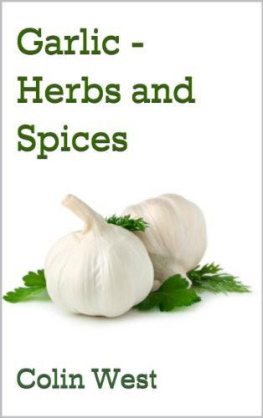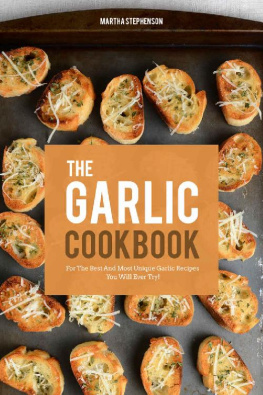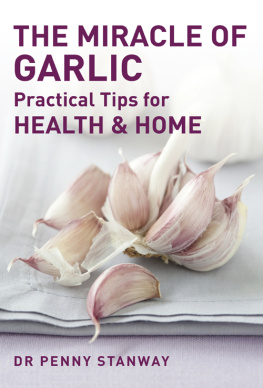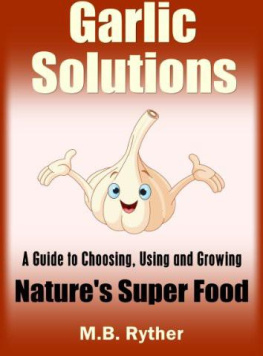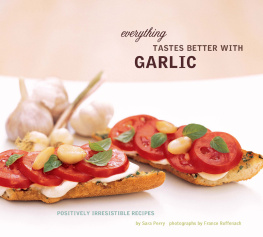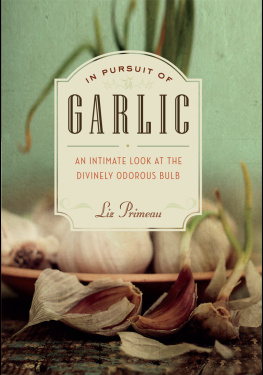West - Garlic: Herbs and Spices
Here you can read online West - Garlic: Herbs and Spices full text of the book (entire story) in english for free. Download pdf and epub, get meaning, cover and reviews about this ebook. year: 2012, publisher: CW Publications, genre: Home and family. Description of the work, (preface) as well as reviews are available. Best literature library LitArk.com created for fans of good reading and offers a wide selection of genres:
Romance novel
Science fiction
Adventure
Detective
Science
History
Home and family
Prose
Art
Politics
Computer
Non-fiction
Religion
Business
Children
Humor
Choose a favorite category and find really read worthwhile books. Enjoy immersion in the world of imagination, feel the emotions of the characters or learn something new for yourself, make an fascinating discovery.
- Book:Garlic: Herbs and Spices
- Author:
- Publisher:CW Publications
- Genre:
- Year:2012
- Rating:4 / 5
- Favourites:Add to favourites
- Your mark:
- 80
- 1
- 2
- 3
- 4
- 5
Garlic: Herbs and Spices: summary, description and annotation
We offer to read an annotation, description, summary or preface (depends on what the author of the book "Garlic: Herbs and Spices" wrote himself). If you haven't found the necessary information about the book — write in the comments, we will try to find it.
Want to know all about garlic, this bite-sized book explains some history of garlic, what garlic is good for, how to grow garlic at home, and my 10 favorite easy to cook garlic recipes.
From the AuthorMy latest book - all about garlic, fun putting this together, difficulty was keeping it to the 50 page limit as there is so much to say about garlic!
From the Inside Flapchew on this book for some great tips for growing and recipes for eating garlic!
West: author's other books
Who wrote Garlic: Herbs and Spices? Find out the surname, the name of the author of the book and a list of all author's works by series.
Garlic: Herbs and Spices — read online for free the complete book (whole text) full work
Below is the text of the book, divided by pages. System saving the place of the last page read, allows you to conveniently read the book "Garlic: Herbs and Spices" online for free, without having to search again every time where you left off. Put a bookmark, and you can go to the page where you finished reading at any time.
Font size:
Interval:
Bookmark:
 herbs & spices
herbs & spices
all about garlic
by Colin West
Copyright 2013 by Colin West
No part of this book may be reproduced in any form or by any electronic or mechanical means, without permission in writing from the author. The only exception is where a reviewer may quote short excerpts in a related review.
Visit my website and sign up to receive a herbal email course.. howtogrowherbgarden.com
Current Books in the herb series:
#1 Herbs & Spices all about ginger
#2 Herbs & Spices all about chives
#3 Herbs & Spices all about garlic
First Published May 2012 All Rights Reserved
Contents

Introduction
This book is dedicated to the incredible and wonderfully aromatic herb we know as garlic .
Garlic is a part of the allium genus - allium sativum in fact - and thus is part of the onion family. It is, of course, best known as a fantastic cooking ingredient, used for its wonderful taste worldwide.
The genus allium itself has in fact about 500 species - other well known plants in this genus are onions, chives, scallions and even leeks.

Garlic can actually be considered both as a vegetable and an herb. It has also been used for medicinal remedies for thousands of years - since ancient Greek and Roman times in fact, and maybe before.
For the last 3000 years of human history Garlic has been both cherished and reviled, sought after for its undoubted healing powers, but also sometimes shunned for its pungent after-effects!

So, from being used as a miracle drug then to acting as a vampire repellent, and even offering for the gods, this extraordinary plant has had an undeniably important place in human history, and today enjoys a renewed surge in popularity as modern medicine unearths the wonders of this ancient superfood .
The psychological term for the fear of garlic is, not surprisingly, alliumphobia .
Garlic is an excellent garden choice for even the newest of gardeners - as it is simple to grow, tastes delicious, and is easy to maintain.
Garlic grows well in almost every climate too, and the bulbs from one harvest can be used as seeds for the following years harvest.
Individual garlic cloves will act as the seeds . The bulbs grow underground at first, and the leaves shoot up into the air. Although garlic is traditionally thought of as a Mediterranean ingredient it is also grown successfully in some colder Northern climates. The majority of garlic grown in the USA for instance actually comes from California.
There are many different garlic varieties, the two most common varieties being the common hardneck (stronger flavor) and the softneck (or wild garlic).

When picking out garlic at the store, choose firm, tight, and heavy, dry bulbs.
Garlics uniquely pungent flavour is a result of the chemical reaction that occurs when garlic cells are broken down. The flavour is most intense just after mincing, and this is the most common way of using garlic in cooking in the west.
Useful Tip - the smell of garlic can be actually be removed by running your hands under cold water while rubbing a stainless steel object, like a spoon or a fork. Bet you never knew that!
It is believed in certain parts of the world that garlic can help to improve your sexual health. This feature of garlic as an aphrodisiac was even referred to by Aristotle and in ancient Indian writings.
If you dont have a bottle of adhesive or glue handy, you can use a bunch of crushed garlic cloves to make an instant glue. Garlic glue can be made by rubbing garlic juices on paper or glass. Adhesives made of garlic are sometimes used to repair glass in China.
The Many Uses of Garlic
Fresh garlic has many active constituents including allicin, alliinase and unique sulphur compounds. Allicin and the sulphur compounds are the ingredients primarily responsible for garlic's potency as an antibiotic, anti-viral, or fungicide, and also for its use in treating high blood pressure, lowering cholesterol, and for helping to prevent certain types of cancer.
Garlic has also been used to treat acne, warts, and toothaches. Even if your garlic has already sprouted, it is still usable although it has most likely lost some of its flavour and health benefits.
 And another benefit of garlic is that if your rose garden is being attacked by aphids, an excellent home remedy to get rid of them is to spray the leaves and blooms with a mixture of crushed garlic and water. Try it.
And another benefit of garlic is that if your rose garden is being attacked by aphids, an excellent home remedy to get rid of them is to spray the leaves and blooms with a mixture of crushed garlic and water. Try it.You can use garlic to repel night-time mosquitoes in tropical climates by placing cloves where there are mosquitoes, or by applying extracts to theexposed parts of your skin.
Simply mix some garlic cloves with pepper and a bit of soap to make your own garlic pesticide. Some gardeners even use garlic mixtures to keep animals such as rabbits, deer, and groundhogs away from their vegetables.
So there are some very positive garlic health facts that are now widely accepted. Garlic has also blood cleansing and antibiotic properties that can be effective against acne and other skin ailments. You can try to get rid of persistent pimples by rubbing raw garlic cloves on your face. Crush garlic cloves and extract their juices to use for this.
If youre going out on a date, consider putting a little garlic on the menu, just enough to keep the passion flowing without the odor getting in the way. Make sure you both eat some however!
 The "stinking rose" treatment has been used extensively in herbal medicine down the centuries. It has been considered by many to be the herbal "wonder drug", with a reputation for prevention or treating everything from the common cold to the Plague.
The "stinking rose" treatment has been used extensively in herbal medicine down the centuries. It has been considered by many to be the herbal "wonder drug", with a reputation for prevention or treating everything from the common cold to the Plague.Another of the interesting potential applications are suggestions that garlic might be able to assist in the management of blood pressure and cholesterol levels. The key is the allicin , which breaks down into the foul-smelling sulphur compounds which give the garlic breath. These compounds react with red blood cells and produce hydrogen sulphide - which relaxes the blood vessels, and keeps blood flowing easily.
Modern science has shown that garlic is a powerful natural antibiotic, albeit broad-spectrum rather than targeted. The bacteria in the body do not appear to evolve resistance to the garlic as they do to many modern pharmaceutical antibiotics. This means that its positive health benefits can continue over time rather than helping to breed antibiotic resistant "superbugs".
Studies have also shown that garlic - especially aged garlic - can as mentioned have a powerful antioxidant effect. Antioxidants can help to protect the body against damaging free radicals.
Some people who want to enjoy the health benefits without the taste may prefer to take garlic supplements (my own father was one such). These pills and capsules have the extra advantage of avoiding garlic breath. Research suggests that people who take a garlic supplement each day are less likely to fall victim to the common cold.
Next page
Font size:
Interval:
Bookmark:
Similar books «Garlic: Herbs and Spices»
Look at similar books to Garlic: Herbs and Spices. We have selected literature similar in name and meaning in the hope of providing readers with more options to find new, interesting, not yet read works.
Discussion, reviews of the book Garlic: Herbs and Spices and just readers' own opinions. Leave your comments, write what you think about the work, its meaning or the main characters. Specify what exactly you liked and what you didn't like, and why you think so.

